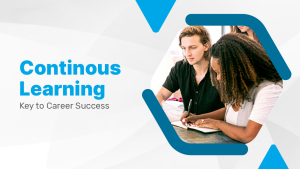Introduction
The world is evolving rapidly, and keeping up with the latest trends, skills, and knowledge is essential for career success. No matter what industry you work in, continuous learning is the key to career growth and long-term success.
In today’s competitive job market, employers seek professionals who show a commitment to professional development. The ability to adapt, learn new skills, and improve continuously can set you apart from others. Whether you’re a recent graduate or an experienced professional, investing in lifelong learning can help you stay relevant, improve your confidence, and boost your earning potential.
This article explores the benefits of continuous learning, different ways to enhance your workplace skills, and practical tips to integrate learning into your busy schedule.
What is Continuous Learning?

Continuous learning refers to the process of gaining new knowledge, improving skills, and staying updated with industry trends throughout your career. It goes beyond formal education and includes professional development, self-learning, and hands-on experience.
Types of Continuous Learning
- Formal Education: Enrolling in degree programs, certifications, or workshops to enhance knowledge.
- Self-Learning: Reading books, taking online courses, and exploring new concepts independently.
- On-the-Job Training: Learning new skills at work through mentorship, training programs, and job rotations.
- Networking and Conferences: Attending industry events to stay informed about career advancement opportunities.
By integrating these learning methods into your routine, you can expand your knowledge and stay ahead in your field.
Tips for Staying Motivated in Your Learning Journey

It’s easy to start continuous learning, but staying consistent can be difficult. Here are some tips to help you stay motivated:
- Set Clear Goals: Identify what you want to learn and why.
- Create a Study Schedule: Allocate specific time slots for learning.
- Reward Progress: Celebrate small achievements to stay inspired.
- Stay Curious: Explore different subjects to keep learning fun.
- Join Learning Communities: Engaging with like-minded people boosts accountability.
Why Continuous Learning is Crucial for Career Success

The job market is constantly changing, and professionals who embrace continuous learning can experience multiple benefits. Here’s why learning should be a lifelong habit:
1. Enhances Career Growth Opportunities
Employers value employees who invest in professional development. Expanding your skills increases your chances of career advancement, leading to better job roles, promotions, and higher salaries.
- Helps you qualify for leadership positions.
- Makes you a strong candidate for internal promotions.
- Increases job security in competitive industries.
2. Keeps You Competitive in the Job Market
New technologies and business practices emerge every day. To remain relevant and competitive, professionals must continuously update their workplace skills.
- Helps you adapt to changing industry demands.
- Positions you as an expert in your field.
- Prevents your skills from becoming outdated.
3. Improves Job Satisfaction and Confidence
Learning new things gives you a sense of accomplishment, boosts your confidence, and makes work more exciting. Employees who continue learning feel more motivated and engaged in their careers.
- Builds problem-solving and critical-thinking skills.
- Reduces boredom and stagnation in your role.
- Improves self-confidence when handling new challenges.
4. Opens Up New Career Paths
Continuous learning helps you explore new interests and career possibilities. You can transition into different industries, start a side business, or even switch careers entirely.
- Expands job opportunities in different fields.
- Increases versatility in handling diverse tasks.
- Prepares you for entrepreneurship and leadership roles.
Ways to Incorporate Continuous Learning into Your Career

Balancing continuous learning with a full-time job can seem challenging, but the right approach makes it achievable. Here are some practical ways to integrate learning into your career:
1. Take Online Courses and Certifications
E-learning platforms provide flexible, affordable courses that can help you gain new skills.
- Websites like Coursera, Udemy, and LinkedIn Learning offer industry-specific training.
- Certifications in project management, digital marketing, and programming can enhance your resume.
- Online courses allow you to learn at your own pace without disrupting work.
2. Read Books and Industry Publications
Reading is one of the simplest ways to stay updated and informed.
- Follow industry-specific blogs, journals, and newsletters.
- Read books on leadership, business strategy, and skill enhancement.
- Join a reading group to discuss career-related topics.
3. Attend Webinars, Conferences, and Workshops
Networking events and live seminars help you connect with professionals and learn from experts.
- Webinars provide real-time learning opportunities with industry leaders.
- Conferences allow you to gain insights into industry trends.
- Hands-on workshops improve technical and soft skills.
4. Seek Mentorship and Coaching
Learning from experienced professionals can speed up your career growth.
- Find a mentor within your workplace or professional network.
- Join mastermind groups for peer-to-peer learning.
- Engage in coaching programs for leadership and skill-building.
5. Develop a Personal Learning Routine
Making learning a daily habit leads to long-term success.
- Dedicate 30 minutes a day to skill improvement.
- Listen to career-related podcasts while commuting.
- Practice new skills through small projects or freelancing.
By incorporating these methods into your routine, lifelong learning becomes an enjoyable and fulfilling part of your career.
Embracing Continuous Learning

Embracing continuous learning is a powerful choice for your career. It means being open to new ideas and experiences, and recognizing that there is always something more to learn. By committing to lifelong learning, you can adapt to changes in your field, grow in your skills, and seize new opportunities. This mindset not only enhances your professional life but also enriches your personal growth, making you a more well-rounded individual. Remember, the journey of learning is ongoing, and the more you embrace it, the more successful you will become.
Challenges of Continuous Learning
Despite its benefits, continuous learning also comes with challenges. Many professionals struggle to find time for learning while managing their work and personal lives. Additionally, the fast pace of change can make it difficult to keep up with new information and skills. Some people may also feel overwhelmed by the many learning options available, making it hard to choose the right path for their career.
The Future of Continuous Learning

Looking ahead, continuous learning will remain essential for career success. As technology continues to evolve, the demand for new skills will only increase. Professionals who embrace continuous learning will be better prepared to face future challenges and seize new opportunities. Companies that support their employees’ learning journeys will also benefit by having a more skilled and adaptable workforce. In this way, continuous learning will play a vital role in shaping the future of work.
Comparative Table: Traditional Learning vs. Continuous Learning
| Aspect | Traditional Learning | Continuous Learning |
|---|---|---|
| Learning Style | Structured courses with set schedules | Ongoing learning as you work |
| Focus | Earning a degree or certificate | Gaining new skills and knowledge |
| Timing | Limited to specific times | Continuous throughout your career |
| Flexibility | Less room to adapt | Easily adjusts to changes in your field |
| Career Impact | Initial job qualifications | Opportunities for growth and advancement |
Analysis Table: Comparison of Learning Methods
| Learning Method | Benefits | Best For |
|---|---|---|
| Online Courses | Flexible learning, affordable options | Working professionals, students |
| Reading Books & Blogs | Improves knowledge, enhances vocabulary | Self-learners, researchers |
| Webinars & Conferences | Networking opportunities, expert insights | Industry professionals |
| Mentorship Programs | Personalized guidance, career advice | New employees, career switchers |
| On-the-Job Training | Practical experience, hands-on learning | Employees seeking promotions |
Conclusion
Continuous learning is no longer optional it’s essential for career growth, professional development, and long-term success. Whether you’re looking to improve your workplace skills, stay ahead of industry trends, or explore new career opportunities, investing in lifelong learning will always pay off.
By taking online courses, reading regularly, attending workshops, and seeking mentorship, you can develop new skills and gain valuable learning opportunities. The key is to make learning a habit, stay curious, and take charge of your own career advancement.
Call to Action
What’s your favorite way to continue learning? Share your experiences in the comments below! If you found this guide helpful, explore more professional growth tips on our website.












